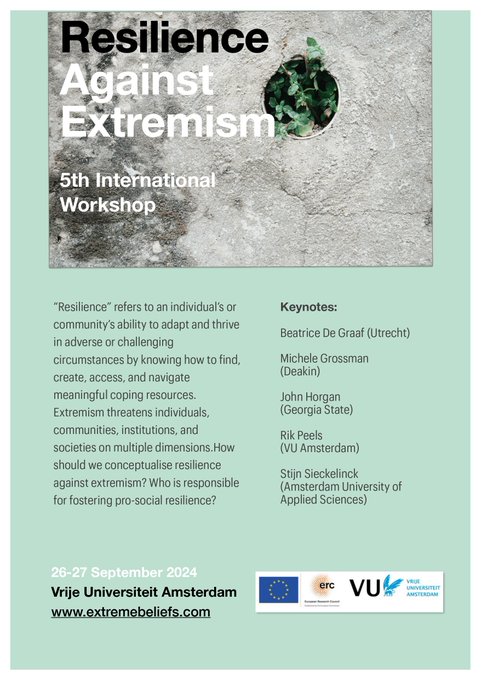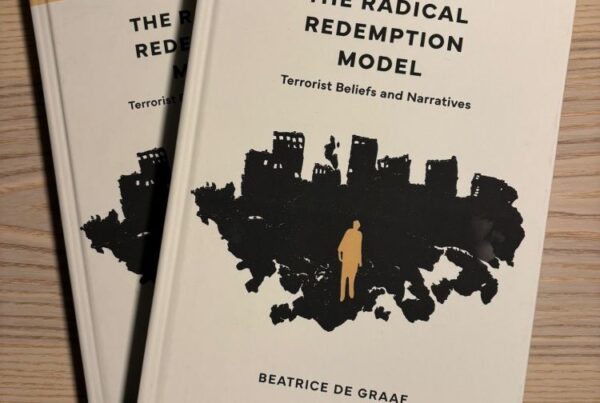CFP: Resilience against extremism: Protecting individuals, communities, and democratic institutions
VU Amsterdam
26-27 September 2024
This workshop focuses on the concept of resilience against extremism. “Resilience” refers to an individual’s or community’s ability to adapt and thrive in adverse or challenging circumstances by knowing how to find, create, access, and navigate meaningful coping resources. Extremism threatens individuals, communities, institutions, and societies on multiple dimensions. First, they are confronted with extreme behaviour and its consequences. Second, they are confronted with the presence of extremism in their environment, fostering adverse conditions. Third, they may themselves run the risk of radicalisation. Pro-social resilience against all these adversities is a complex phenomenon requiring a broad range of methodological perspectives and approaches.
Relevant questions include but are not limited to:
- How should we conceptualise resilience against extremism in light of different fields’ approaches to the issue? Is, for instance, resilience always prosocial?
- What role do cultural, political, economic, and other systemic factors play in fostering resilience and how do they relate to beliefs and dispositions of individuals that constitute communities?
- Which individuals, groups and institutions are responsible for fostering pro-social resilience, and how do these responsibilities interact?
- Is resilience of a community compatible with the radicalisation of some of its members?
- How does resilience in the moral, political, and religious domains relate to each other? For example, does moral resilience foster religious resilience or vice versa?
- Can resilience be operationalised and measured?
- How does resilience relate to deradicalization and disengagement from extremist behaviour?
- How should we construe the resilience of democratic institutions and societies ontologically and epistemologically, in contrast with the resilience of individuals or communities?
- Are there specific best practices for building resilience towards, for example, right-wing extremism, Salafi Jihadism, inceldom, and radical conspiracy theorizing that can be implemented elsewhere?
- What is the role of education in creating resilience?
- What are religious and secular resources – beliefs, practices, rituals, systems – that can help make communities resilient against radicalization?
- Should radicalisation itself be modelled as a resilient but dysfunctional response to adverse circumstances?
Keynotes:
Beatrice De Graaf (Utrecht)
Michele Grossman (Deakin)
John Horgan (Georgia State)
Rik Peels (VU Amsterdam)
Stijn Sieckelinck (Amsterdam University of Applied Sciences)
Format:
Two-day workshop consisting of 5 keynote lectures, various shorter lectures, and a few lightning talks (probably some 15-20 presentations in total). The focus will be on the face-to-face meetings and we ask speakers to present in person, but for the audience there will be room for online participation.
Abstracts:
Please anonymously prepare your abstract with a title (max 300 words, excluding title).
Send the abstract by email with the subject line “Abstract Resilience against Extremism” to extremeBeliefs.fgw@vu.nl and your full name and affiliation (if any) in the email no later than Friday, June 28th, 2024. We will send out notice of accepted abstracts no later than July 21st 2024. We especially encourage early career and people from underrepresented groups to apply.
Organizers:
Jakob Ohlhorst, Rik Peels, Anna Haase
About:
The workshop is part of a series of workshops facilitated by the Extreme Beliefs: The Epistemology and Ethics of Fundamentalism project at the Vrije Universiteit Amsterdam. The project is funded by the European Union’s Horizon 2020 Research and Innovation Program (Grant Agreement No. 851613).


